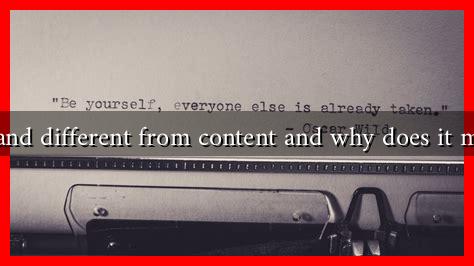-
Table of Contents
Is Brand Different from Content and Why Does It Matter?
In the digital age, where information is abundant and attention spans are short, understanding the distinction between brand and content is crucial for businesses aiming to thrive. While both elements are integral to a company’s marketing strategy, they serve different purposes and resonate with audiences in unique ways. This article delves into the differences between brand and content, why these distinctions matter, and how they can be leveraged for effective marketing.
Understanding Brand and Content
To grasp the differences between brand and content, it’s essential to define each term clearly.
What is Brand?
A brand is more than just a logo or a name; it encompasses the overall perception of a company in the minds of consumers. It includes:
- Identity: The visual elements such as logos, colors, and typography.
- Values: The principles and beliefs that guide a company’s actions.
- Personality: The human traits attributed to a brand, which can influence customer relationships.
- Reputation: How a brand is perceived based on past interactions and experiences.
For example, Apple is not just known for its products; it is recognized for its innovation, quality, and premium positioning in the market. This perception is cultivated through consistent branding efforts over the years.
What is Content?
Content refers to the information and experiences that are created and shared to engage an audience. It can take various forms, including:
- Blog Posts: Articles that provide valuable information or insights.
- Videos: Visual content that can entertain or educate.
- Social Media Posts: Short-form content designed for engagement and interaction.
- Podcasts: Audio content that can inform or entertain listeners.
For instance, a company like HubSpot produces a wealth of content aimed at educating marketers and business owners, thereby establishing itself as a thought leader in the industry.
The Key Differences Between Brand and Content
While brand and content are interconnected, they serve different functions in a marketing strategy:
- Purpose: Brand focuses on building recognition and loyalty, while content aims to inform, entertain, or persuade.
- Longevity: A brand is a long-term asset that evolves slowly, whereas content can be created and consumed rapidly.
- Emotional Connection: Brands often evoke emotions and foster relationships, while content primarily delivers information.
Understanding these differences is vital for marketers. A strong brand can enhance the effectiveness of content, while high-quality content can reinforce brand values.
Why Does It Matter?
The distinction between brand and content matters for several reasons:
1. Strategic Alignment
When brands and content strategies are aligned, businesses can create a cohesive message that resonates with their target audience. For example, Nike’s “Just Do It” campaign not only promotes its products but also embodies the brand’s ethos of empowerment and determination.
2. Audience Engagement
Content that reflects a brand’s values can foster deeper connections with consumers. According to a study by HubSpot, 70% of consumers prefer to learn about a company through articles rather than ads, highlighting the importance of content in building brand awareness.
3. Competitive Advantage
In a crowded marketplace, a strong brand can differentiate a company from its competitors. For instance, Coca-Cola’s branding strategy focuses on happiness and togetherness, which sets it apart from other beverage companies.
Conclusion
In summary, while brand and content are distinct elements of a marketing strategy, they are interdependent. A strong brand provides a foundation for effective content, while high-quality content can enhance brand perception. Understanding these differences allows businesses to create more effective marketing strategies that resonate with their audience, foster loyalty, and ultimately drive growth. By aligning brand values with content creation, companies can not only engage their audience but also build lasting relationships that contribute to long-term success.

